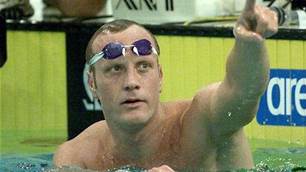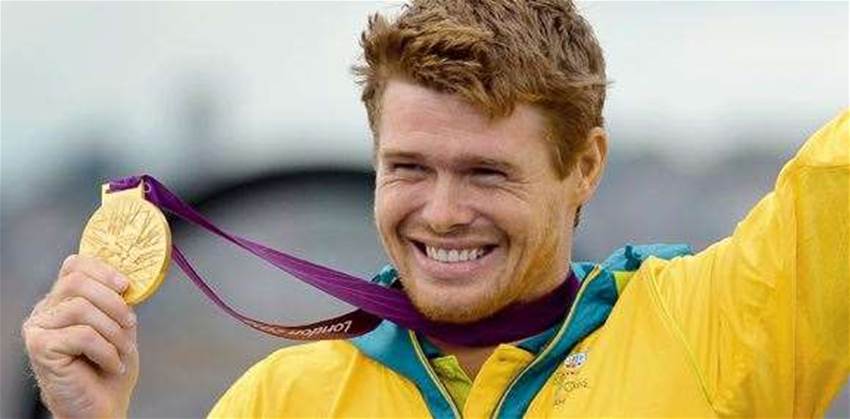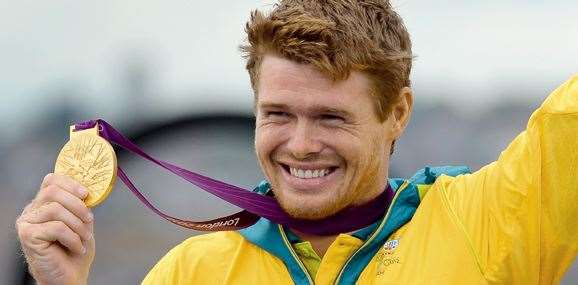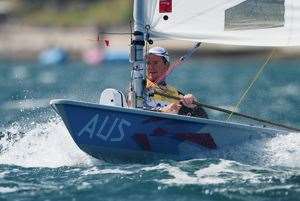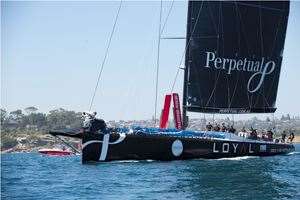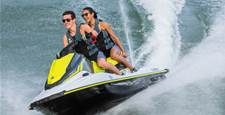Tom Slingsby has so many sailing decorations to his name that it’s tempting to say he’s “done it all” in the sport. But he hasn’t.
Tom Slingsby has so many sailing decorations to his name (eight world championships, ISF Sailor of the Year, Olympic gold medal in the Laser class at the 2012 London Games, strategist for the America’s Cup winners Oracle Team USA recently in their spectacular comeback), that it’s tempting to say he’s “done it all” in the sport. But he hasn’t.
He may have been sailing since he could walk, but at the age of 29 he still hasn’t sailed in the Rolex Sydney-To-Hobart Yacht Race. But that’s about to change. The prestigious ocean racing trophy will be in his sights when the fleet heads out through Sydney Heads on Boxing Day. Slingsby will be aboard the maxi Perpetual Loyal – a real shot at taking line honours. The affable but humble champ took time out from his preparations to review the highs and highers that have characterised his sailing career ...
Congrats on your win in the America’s Cup. Was that the fastest you’ve ever gone under sail power? I read that you were hitting 80km/h ... It looked completely frightening.
Yeah, I think we got to 90km/h, which is definitely the quickest I’ve ever been on a sailing boat. All our chase boats needed about 1000 horsepower to keep up with us. It was pretty amazing.
The world sail record is actually held by a kite surfer, isn’t it?
Ah no, it’s actually now held by a boat called Sailrocket, by an Australian guy called Paul Larsen. It recorded about 65 knots. But you have to remember the America’s Cup boats are set up for a race track, where you have to go upwind just as quick as downwind. If we configured these boats just for straightline speed – just a speed run, like that sailing record – I think you could do high 50 knots in them for sure.
Were there ever times when you genuinely feared for your safety throughout the Cup?
Yeah, there were some terrifying moments. We were the first team to ever capsize a boat like that and at the time I was the person furthest back in the boat, which meant I was the highest person. I was about 20 metres in the air, with a lot of sharp carbon fibre and rigging below, so I’d have to watch out if I fell. Luckily, I was able to hold on and climb down
– that was definitely the scariest moment for me.
Was that equipment failure?
Ah, no. That was back in October 2012, on our eighth day of sailing. We were learning, and we were out there in pretty extreme conditions, and in hindsight we probably should have taken it a bit easier. But we were out there pushing the limits all the time with these new boats, and that time we pushed it too hard.
When you were racing in the finals series, you had that boat cranked to the max the whole time, didn’t you?
Yeah, you’re looking for every single 0.1 of a knot. Even at those speeds you’re still looking for anything you can do to get more. Basically, you just want to be a little bit quicker than your opposition, so you’ve got to do everything you can do to get that.
There were noises coming through the mikes when the TV broadcast was onboard with you guys – the boat was groaning. It sounded like the thing was going to explode ...
That’s the sound of ropes being eased off over the winches. The loads on that boat are extremely high – you’re looking at five tonnes of load on some of the ropes and ten tonnes of load on the rig. That’s the noise you get.
How good a skipper is James Spithill?
Jimmy’s awesome. Under pressure he definitely doesn’t flinch at all. He never loses his cool, he’s always calm, and he’s a very good leader.
I don’t think I heard a raised voice on your boat.
Yeah, we were all pretty good. Sometimes you had to yell a bit – just the sound of the wind going past you at those speeds is pretty high. But in our whole program there was never anyone yelled at in anger at all. The guys we had on the team are extremely professional, and we know that any sort of putting down of another team member definitely isn’t going to make him perform any better – we know they’re only going to get worse if you constantly pick on them. The crew was great.
Modesty aside now: how much did you have to do with finding that 0.1 of a knot? What were you doing out there?
My role was strategist. Basically, I’m just helping the tactician and skipper. I’m talking about what I’m seeing on the water and where I think I would go and this and that, but in the end the tactician would make the call. But I think a lot of my important role was off the water in developing the techniques so we could sail the boat – how could we do better jibes than the Kiwis? How could we mode the boat to make it go faster and faster?
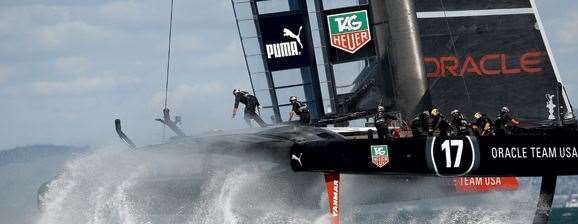 “I think we got to 90km/h, which is definitely the quickest I’ve ever been on a sailing boat.” Photo: Getty Images
“I think we got to 90km/h, which is definitely the quickest I’ve ever been on a sailing boat.” Photo: Getty ImagesThe Kiwis were clearly faster in the first half of the final, but then you guys were able to find extra speed. Was that the off-water tweaking you’re talking about?
It was. We changed a few things on the boat, but the biggest thing was the meetings we had and the talks we had with the crew about how we can change the technique of sailing the boat. We had this amazing weapon there, and we just had to learn how to sail it better. We’d go, “Okay, let’s not do this at that point, let’s change it and do it like this.” We had a lot of meetings like that, and on the laydays when the Kiwis would take off and rest, we’d go out and practise this new technique. So we just consistently kept getting better and better, and luckily it was just in time.
The way the Oracle Team USA crew moved around during those hairy jibes, when you guys were running across to the other side of the boat – is that the sort of thing you’re talking about?
Yeah, but when you’re crossing a boat at those speeds, the apparent wind across the boat is sometimes around 60 knots. So when you run to the other side, you’ve got to remember that you pretty much have a cyclone trying to blow you off the back of it.
It was gobsmacking to watch. But how much sweeter would that victory have been do you reckon if you were sailing under the Aussie colours?
Ah, one day I definitely want to be part of a really good Australian team – but I’m actually also a citizen of the United States. So I was competing for my other country.
I didn’t know that. Is that via your parents?
Yeah, my mother is American. Australia didn’t have a team, so I was very happy to be part of an American winning team.
What sort of a bloke is Larry Ellison? He comes across as a bit of a mystery man.
He’s great, actually. Every time he comes in you expect that we’re going to have to get him up to speed on what we’re doing, whether it be on foil shape or hull shapes or what we’re changing on the boat. But he gets copied in on all the important emails in the team and he definitely reads them all – every single word. So when he comes in he knows exactly what we’re thinking of changing, and he gives his opinion. Extremely competitive – he’s definitely a sportsman. I think he’s one of those genius-type guys – anything he looks at he can figure it out very quickly. Very smart guy.
How did that win compare to an Olympic Games gold medal?
They’re very different – obviously one’s solo and one’s with a team. I still have to put the Olympic gold medal a bit above, just because of all the adversity I went through.
I went into China (2008) as the favourite and bombed out, and then I had to regroup and come back. I got back to the top in the world with all the same pressure, and finally in London I was able to perform at the Olympics.
What happened in Beijing? The number 23 looks unusual next to your name on your career history.
Yeah, I hadn’t really lost an event in a long time, and I struggled for boat speed there – you get supplied equipment, and I just couldn’t adapt the boat. When you don’t have boat speed, you take a lot more risks, and every risk I took seemed to go the other way on me. It was just a place that confused me. Almost no wind – a lot of current ... It was just really tough.
You were in a Laser – one of the Olympic classes where you get to sail on your own. Does that tell us anything about what sort of competitor you are?
I just love the man-on-man combat sort of thing. I loved going out there and trying to prove that I was better than the guy next to me. And then as I got better and better, eventually I just wanted to prove that I was the best in the world. The Laser was perfect – it’s such a great boat. You can go out there and sail by yourself – you don’t need to organise a crew. Very simple boat – takes you five minutes to get on the water. It’s a great class.
It’s an exhilarating boat when you get it cranked up too, right?
Well, in the Laser, you’re not doing it for the sheer speed, even though when you get going you can really feel it because you’re so close to the water. But you do it for the racing and the camaraderie between all the guys. There’s sort of a different reason you sail each type of boat.
It sounds like, after all your involvement, that you still get a kick out of the sport. It hasn’t turned into “work” for you yet?
Nah, it hasn’t. I still love it. I’d be sailing even if I wasn’t paid to do it. I go out for twilight sails when I can, and yeah, just love testing myself, and there’s so many different areas – Olympic sailing, America’s Cup, ocean racing, so many different avenues you can go down ... I just love it.
And you’re doing the Rolex Sydney-To-Hobart this year for the first time? It surprises me that you haven’t been roped into a crew before ...
Yeah, I’ve been asked every year for about the last ten years, but I’ve always had either Olympic commitments, or they’ve been off years and I’ve just wanted to sit at home and watch the Hobart start with a beer in my hand with my family – I’m definitely guilty of that a few times. But I thought this one’s a really good opportunity and I’d really like to be a part of it.
Can you tell us a bit about the boat you’re on?
Yeah, I’m racing on Perpetual Loyal. Anthony Bell is the owner. It’s not a new boat, but it’s new to Australia. It’s 100 foot long – got a great crew, got a great cause, raising money for the Loyal Foundation, and I think in the right conditions we’ve got a good shot at knocking off Wild Oats, so it’s a good opportunity.
So this is your first taste of ocean racing?
Yeah, ocean racing is one thing I haven’t gotten into yet. But I’m happy to see if I like it or not.
You’re a lot colder and wetter for longer, aren’t you?
Yeah, you can’t just go home and put your feet up and watch TV at the end of a day ... Some of these guys do it for weeks and months on end, racing around the world. It takes a certain type of person – they’re very hard men. Extremely tough guys. We’ll see if I am or not ...
Are you old enough to remember watching the 18-footers going around in the lunch breaks of the cricket back in the 1980s and ’90s?
Yeah, I loved it. I used to tape every race. Never missed watching them.
Who were your first sailing heroes?
I always cheered for Rob Brown on Prudential; I know Rob very well now. I’ve also gotten to know Chris Nicholson quite well, and I always cheered for him on Skilled Engineering – he’s a great guy. But when I was growing up, the 18-foot skiffs were the ultimate goal.
What does a professional sailor like yourself do on a day off? Go sailing?
Yeah, I love sport. I’m right into kite surfing at the moment – I played golf today. Windsurfing. I’m going to get back into surfing. I love the water. The wind. And just any sport I’ll generally have a crack at.
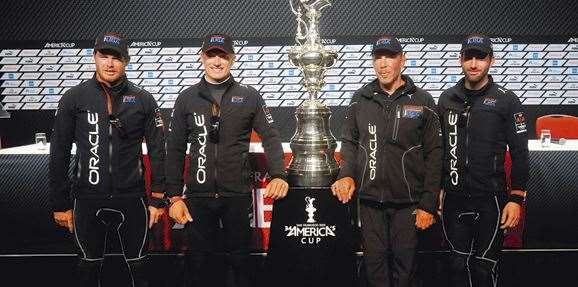 Aussies Slingsby and James Spithill (left) did Oracle Team USA CEO Larry Ellison (second right) very proud. Photo: Getty Images
Aussies Slingsby and James Spithill (left) did Oracle Team USA CEO Larry Ellison (second right) very proud. Photo: Getty ImagesI can’t imagine there’s a lot of income when you dedicate yourself to an Olympic Games campaign. Are you starting to find that the rewards are coming your way a bit now?
Yeah, definitely. With the Olympic sailing you do it for the love and the drive for yourself to reach your personal goals and be an Olympic champion. You don’t do it for the money, that’s for sure ...
But it looks pretty good on your CV ...
Yeah, it does for sure – it opens a lot of doors when you become an Olympic champion. You get great opportunities, like sailing for an America’s Cup team. And in America’s Cup you can finally start making some proper money.
What other challenges are ahead of you in the sport? Are you going back to defend the America’s Cup?
Yeah, I’ve signed with Oracle again. It was a tough decision – obviously we’ve now got an Australian team. But for me, I was part of Oracle for the last campaign. I know all the people –and it’s a really great group. And we’re the defender of the Cup, so we’re already in the final. So for me, it was just a smart choice.
And what would it feel like if you were sailing in the final against the Aussies?
I’ve only just started thinking about that ... It might be a bit of a tricky situation. It’ll be a weird feeling, especially if they make the final, and I hope they do. I think the people they’re aiming for are great sailors and they could very well be in the final, and I’m not too sure how that’ll feel. I’m a citizen of both countries, but I’m definitely an Aussie. When I get asked in America, “So, are you American or Australian?” I say “What do I sound like?” And there’s your answer.
Any chance you’ll be sailing in Rio?
I’m going to take some time off Olympic sailing. But in a year or two, who knows? I might get that drive to try to get another gold medal.
− Graem Sims
Related Articles

Video interview: Drinks With ... Matt Millar
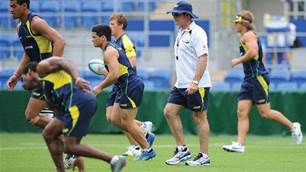
Michael O'Connor still an asset to Aussie 7s squads
